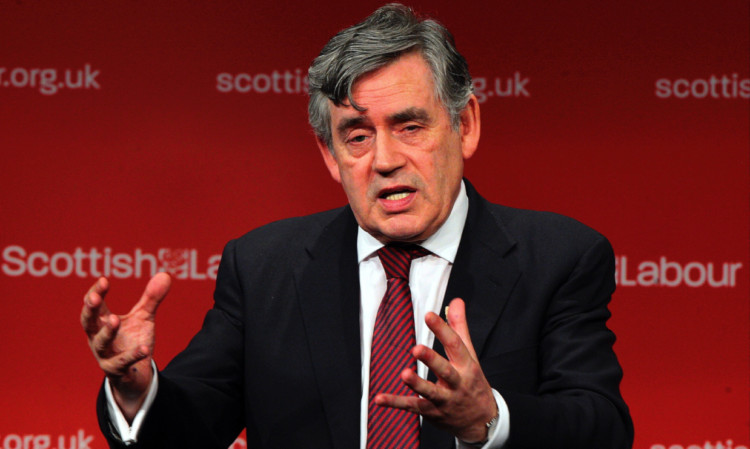Former Prime Minister Gordon Brown has penned a book laying out his reasons for opposing independence. Our reviewer, world-leading referendum expert Professor Matt Qvortrup, draws a surprising conclusion.
There have already been many books about the pros and cons of independence. The book under review is by far the most impressive. Gordon Brown is a genuine intellectual politician. My Scotland, Our Britain, is eloquent and erudite, and yet at the same time personal and passionate. Even those who may occasionally disagree with Mr Brown will be impressed by his knowledge of history, economics and philosophy. As an argument against independence, however, some of the evidence paradoxically supports the case for a “yes” vote.
Reading the book, I was reminded of the eulogy Mr Brown gave at Donald Dewar’s funeral. I recall how Mr Brown spoke with equal measures of sadness and resolve about the First Minister: “He was a great man and a good man,” he said. Mr Brown’s apparently heartfelt references to his duty to intervene in a “debate and a decision that affects children whom I love and people whom I respect” makes it tempting to use the same words about him.
All too often, books by politicians seem more like projects cobbled together by a team of more or less anodyne ghost-writers, with little to say but bland platitudes. However, with a reading list ranging from the French theorist Ernest Renan in the Victorian age to the social anthropologist Ernest Gellner a hundred years later, Mr Brown’s book is the authentic product of a true intellectual.
Mr Brown is diplomatic and constructive. But he clearly believes that the case against independence has not been stated well enough.
“Opponents of independence”, he argues, have not ‘made the connection’ between the ‘prosaic and the somewhat more abstract’ argument against a ‘yes’ on September 18.”
Tellingly, Alistair Darling is not mentioned a single time.
But the intellectual qualities notwithstanding, there is also a sense of hurt in the book, which perhaps, so it seems reflects the condescending treatment that some Scots are subjected to by the English. Mr Brown mentions that Jeremy Clarkson called him a “one-eyed Scottish idiot” and he recalls that a Sun columnist referred to Scottish people as “anti-entrepreneurial, on the make and spendthrift”.
But, as Mr Brown shows, some of the most entrepreneurial individuals in the world have been Scots, to wit, John Logie Baird (the inventor of television), Alexander Fleming (who discovered penicillin) and Robert Watson Watt (who developed radar). Given these attitudes from the English elite, one could not blame voters if they decide to vote for independence. Why stay together if all you get is condescension and abuse?
It is hard to do justice to Mr Brown’s more substantial arguments. They are detailed and sophisticated, but it is questionable if they on reflection bear scrutiny.
It has been a persuasive case for Yes Scotland that independence would bring the country closer to the Scandinavian welfare states. It is Mr Brown’s contention that “inequality could be higher than in England if Scotland were to go independent”. Granted, attacking Yes Scotland from the left at a time when an estimated two out of five Labour voters would vote for independence makes political sense.
But his argument while sophisticated is not convincing. For example, he argues that allocating money to free university education (which benefits the middle classes) means that less money will be spent on those in real need. This sounds reasonable in theory. But the evidence from the Scandinavian states, which many in the Yes camp want to emulate, shows that it is possible to ensure both redistribution and free tuition fees at the same time. Indeed, the provision for free tuition provides the middle classes with an incentive to support the welfare state, as Scottish academics Michael Keating and Malcolm Harvey have shown in Small Nations in a Big World.
Moreover, Mr Brown does not adequately explain why Scots would enjoy more equality if they are ruled from Westminster by a Conservative government. Would a Tory administration at Westminster be more committed to social equality than a Labour government in a future independent Scotland?
In one of the final paragraphs Mr Brown writes: “A brilliant actor doesn’t try to find a stage on which he can stand alone”. But the conclusion from this book is the opposite to the one he sets out to find. Rather than being an argument against independence, the evidence Mr Brown provides, paradoxically, suggests that Scotland is ready to take to the World stage and “act” with other nations.
The author of Referendums and Ethnic Conflict, Professor Matt Qvortrup has been described by the BBC as the world-leading expert on referendums. He was a panellist at last week’s Courier Referendum Debate in Perth.
My Scotland, Our Britain: a Future Worth Sharing by Gordon Brown is out now, published by Simon & Schuster.
